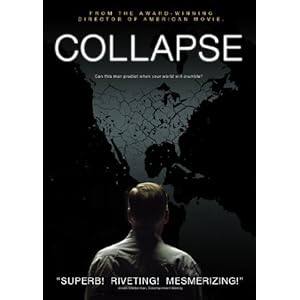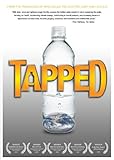 Michael Rupert is a rather infamous doom and gloom guy who's been, for years, predicting financial and social collapse driven by peak oil. It should not be a surprise that in March 2009, in the depths of the financial collapse, that a movie would be filmed featuring Michael Rupert talking about that collapse in terms of what he's been predicting for years. That movie, Collapse, was released in June 2010, and the dire collapse he predicted has been averted through the bailout. Or has it?
Michael Rupert is a rather infamous doom and gloom guy who's been, for years, predicting financial and social collapse driven by peak oil. It should not be a surprise that in March 2009, in the depths of the financial collapse, that a movie would be filmed featuring Michael Rupert talking about that collapse in terms of what he's been predicting for years. That movie, Collapse, was released in June 2010, and the dire collapse he predicted has been averted through the bailout. Or has it?
It's possible to see this movie as an hour and a half of "I told you so", except in truth it's a long lecture on the model of finite resources that's behind the collapse. Instead of "I told you so" it comes across as a strong warning to us, an attempt to educate us on what's going on and ways we might survive. And, surprisingly, the ending of the movie is not his stereotyped doom and gloom.
The setting seems to be as important as the content. For most of the movie we see Rupert, in a darkly lit concrete block room, sitting in a chair, chain smoking cigarettes, and talking. He's passionate about his subject and he knows the pain in the story he's telling us. Interspersed are snippets of film, primarily archival newsreels from the 1950's and earlier, that underscore the points being made by Rupert. The effect is kind of like an interrogation.
The story he lays out is largely one I've written about on this website (see Peak Oil). Back in 2003 I republished an article he published on the From the Wilderness website that laid out the scenario: Eating Fossil Fuels (From The Wilderness)
It starts with Peak Oil - that is, the point where oil companies can no longer increase oil supply. The system we live in is wholly driven by oil and stuff made from crude oil byproducts. Now that the oil supply has peaked we will inexorably enter a period of crisis as tightening oil supplies drive the whole system towards collapse.
The good thing is the collapse will not be like jumping off a cliff with an immediate cessation of oil. Unfortunately that means it's still going to be hard to prove to naysayers that peak oil is happening. In the middle of the movie Rupert tells an interesting fable-like story. He asks, what if you're on the Titanic and know that it's about to sink, you know there aren't enough life boats, and you happen to know how to build lifeboats? What do you do? He suggests the passengers will divide into three camps, those who go into panic, those who recognize the danger and want to go into action to build life boats, and those who will deny reality and go to the bar to have a drink.
He talks about the monetary system. The monetary system used to be based on "gold" and other things that supposedly have real value. Today however our money system is just paper, so what value backs up the money system?
There's a lot of talk about this issue nowadays, and Ruperts discussion falls directly in line with those who call the Federal Reserve a fraud and are calling for a return to the Gold Standard. He essentially calls the system of fiat currency and fractional reserve currency a fraud using nearly worthless paper to fool us into thinking we have money. What he's missing is that the paper, U.S. dollars, are a symbol of the American economy's ability to repay its debts. That is, the Federal Reserve asks everybody to trust that the American economy can continue functioning and pay its debts. It's not that American dollars are valueless, but that the value backing them up is our economy.
However he goes on to describe oil as the energy which drives our economy. Take agriculture as an example. We no longer have real proper agriculture. What we have is oil driven farm equipment, spraying fertilizers derived from oil, spraying pesticides made of oil, shipping "product" around the world in vehicles powered by oil. See the "Eating Fossil Fuels" article linked above for details. Oil drives the system and the abundance of food is directly related to the use of oil.
It's oil that drives our economy, and the ability of America to repay its debts is based on the supply of oil.
Is it any surprise that the collapse in 2008 immediately followed the highest oil prices in the history of oil? Nobody in the mainstream media admits to this, but peak oil researchers including Michael Rupert predicted this years ahead of time.
Rupert goes on to describe the "bumpy plateau" scenario. As oil prices rise the high cost of fuel will cause collapse's, the collapse causes a decrease in oil use, causing a lowering of the oil price. Eventually the lower oil price will allow economic activity to heat up again, increasing demand for oil, until the price goes up again, causing another collapse. It just so happens that many are predicting high oil prices again this year, after the economy "recovered" during a period where oil prices fell a bit from the September 2008 high.
Collapse is a very informative movie which will educate you on the dangers faced by our society. I wouldn't buy it completely at face value because while his story is very well researched, it's a very dark story. It might not be as bad as he says. Or maybe that's my denialism kicking in.
The end of the movie he starts talking about ways to survive the decline he speaks of. And, to be clear, he expects the decline will involve the death of large large quantities of peoples. He shows a graph of world human population that held steady at 1 billion people for hundreds of years until oil became widely used. It's oil that allowed those extra 5 billion people to come into being. Well, oil and modern medicines and modern sanitation methods, but, well, oil. Perhaps with the end of oil that's how many people will die off? Hard to say, and as I say his story is very dark.
But his recommendations for survival are not dark. They are in fact very bright. He points to Cuba's survival of their peak oil scenario (see: Review: The Power Of Community: How Cuba Survived Peak Oil) as an example. They turned to local communities, local agriculture, organic agriculture, and not only survived but are thriving.
One might wonder - just who is Michael Rupert and why should you pay attention to him. He is asked that in Collapse and answers with some history. His parents both worked for the Intelligence services, he was a cop, a detective, and later became an investigative journalist. He broke several large and controversial stories as a journalist.
He's written two books: Crossing the Rubicon: The Decline of the American Empire at the End of the Age of Oil, A Presidential Energy Policy

